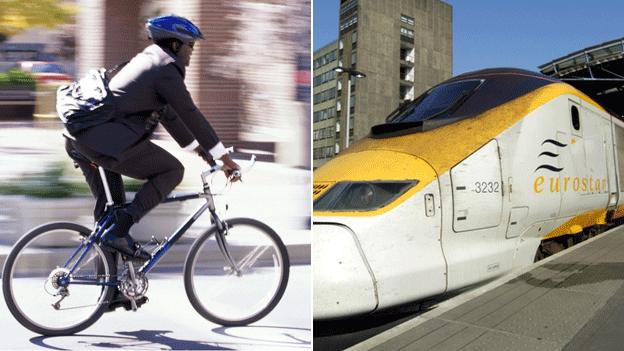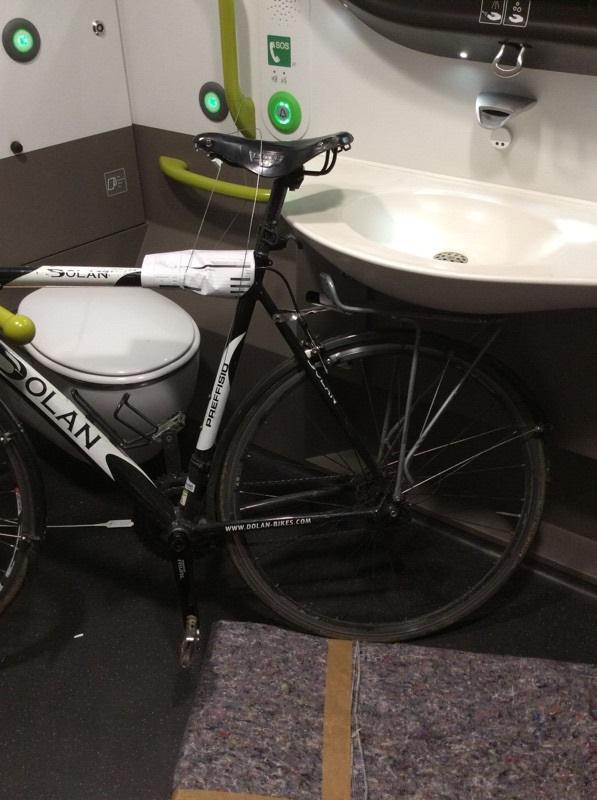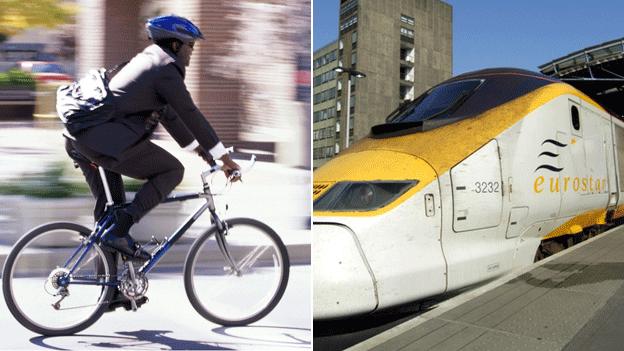Eurostar storing bikes in disabled toilets
- Published

Bicycles are being stored in disabled toilets on some of Eurostar's international services to and from France, the BBC has learned.
Disability charities said it was not acceptable, with Transport for All saying it showed "clear disrespect".
Eurostar said it was "occasionally" using one of two disabled toilets on some trains as a "temporary measure".
It follows the introduction of new trains which do not have goods carriages for bike storage.
Last October, Eurostar told cyclists that bicycles would have to be taken apart and carried in special bike boxes for travel on its services.
The new rules were quickly reversed after thousands of emails of complaint, and criticism from then Mayor of London, Boris Johnson.
'Inconsiderate'
The use of a disabled toilet as alternative cycle storage was "appalling", one member of train crew who spoke to BBC News anonymously said.
"The company has caved in to the bike lobby. This sends a terrible message to disabled passengers."
Eurostar said wheelchair passengers were always seated near the available disabled toilet and the number of disabled passengers that could be booked on each train was not affected.
"This temporary arrangement hasn't had any impact on passengers with reduced mobility," it said.
"All passengers using wheelchairs have been able to travel and have full use of the accessible toilet facilities and this will continue to be the case."
But charities say that those who might need accessible toilets are not always in wheelchairs, may not identify themselves as requiring assistance and could be seated near a toilet being used for a bicycle.

A bicycle being stored in one of Eurostar's disabled toilets, taken from an internal report, seen by BBC News
"This inconsiderate action demonstrates a clear disrespect for many passengers," said Transport for All chairman Alan Benson.
"These facilities are essential for people with a variety of impairments, not just wheelchair users.
"Disabled passengers must not be allowed to suffer as a result of extremely poor design of these multi-million pound trains."
Philip Connolly of Disability Rights UK said the move amounted to "discrimination" against disabled people.
The BBC understands that a number of internal reports have been raised after distressed passengers complained at the lack of available disabled facilities.
Members of Eurostar's own staff have expressed their unhappiness at the policy.
"The new trains have a disabled toilet at each end," the BBC's source explained.
"But if one of those is filled with a bike, a passenger has to walk the whole length of the train to reach an accessible toilet.
"It's just not possible to always sit disabled people near the working loo. There have certainly been times when disabled passengers have been in distress."
'Fed up'
Cycling UK, which led the campaign for bicycles to be allowed on board, expressed its surprise at the new policy and said it was not acceptable.
"Clearly there isn't a solution yet that has been presented by Eurostar to meet 21st century travel needs," said chief executive Paul Tuohy.
Mick Lynch, the RMT union's national organiser with responsibility for Eurostar, said: "They decided they wanted more seats on the new trains so they took out the luggage stowage facility.
"It was a commercial decision. The staff are fed up with it. It's awkward, hiding a bike in a disabled toilet."
Eurostar continues to encourage cyclists to use bike boxes and fully assembled bikes are put on old-style trains when available.
It says it is in the process of modifying the luggage space on the new trains to include space for larger items including fully assembled bikes.
But this will take many months to complete and will not be ready for the busy summer season.
- Published14 October 2015

- Published14 November 2015
